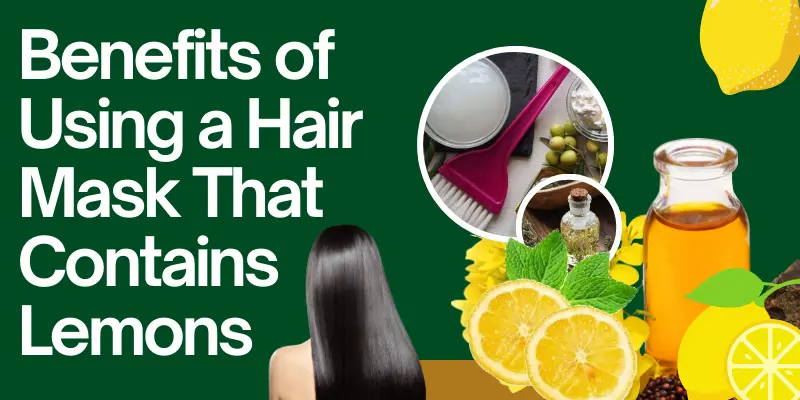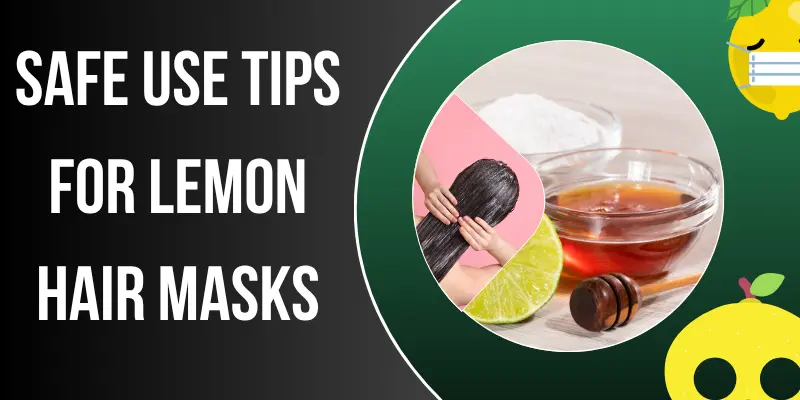Lemon Hair Mask- A Complete Guide for Shiny Hair and Healthy Scalp
Published: 19 Jan 2025
If you’re tired of dull, oily, or flaky hair, you’re not alone. From teens battling oily roots to adults dealing with stubborn dandruff, hair issues can be frustrating. Instead of expensive salon treatments, why not try something from your kitchen? A lemon hair mask is a natural, affordable, and effective solution that works wonders for your scalp and gives your hair a natural shine.
I remember back in college, my hair looked lifeless no matter what shampoo I used. That’s when my grandmother told me about the lemon hair mask she used in her youth. After just a few weeks of using it, my scalp felt cleaner, and my hair had that glossy bounce I’d been missing. Now, I recommend this remedy to everyone who wants a simple but powerful fix.
Let’s explore how lemon can transform your hair naturally.
What is a Lemon Hair Mask?
A yogurt hair mask with lemon is a natural treatment combining lemon juice and nourishing ingredients like yogurt, aloe vera, or oils. The citric acid in lemon helps cleanse the scalp and reduce oil, while yogurt adds moisture, soothes irritation, and supports healthy, shiny hair without harsh chemicals.
Benefits of Using a Hair Mask That Contains Lemons
Hair masks with lemon help clarify the scalp, reducing excess oil and buildup naturally.

Lemon isn’t just a kitchen essential, it’s a beauty hero too. Packed with vitamin C, antioxidants, and antimicrobial properties, it addresses several hair concerns naturally.
1. Fights Dandruff
The acidity in lemon helps balance your scalp’s pH level. It kills dandruff-causing fungi and soothes itching.
2. Adds Natural Shine
Lemon smooths the hair cuticle and removes product buildup. This brings out a healthy, glossy look.
3. Encourages Hair Growth
Vitamin C strengthens hair follicles and boosts collagen production, making it an effective home remedy for hair fall. Regular intake can help reduce shedding and support healthy hair growth naturally.
4. Reduces Excess Oil
Lemon is a natural astringent. It controls sebum (oil) on your scalp, leaving your hair clean and refreshed.
5. Lighten Hair Naturally
Sun + lemon = subtle highlights. For those with light or brown hair, it can brighten strands without harsh chemicals.
DIY Lemon Hair Mask Recipes
Mix fresh lemon juice with honey and yogurt for a nourishing, scalp-cleansing treatment—perfect if you’re learning how to make hair masks at home with natural ingredients.

These easy recipes use ingredients straight from your kitchen. They’re safe, budget-friendly, and suitable for regular use.
1. Lemon and Coconut Oil Mask (For Dandruff & Dry Scalp)
Ingredients:
- 2 tsp fresh lemon juice
- 1 tsp coconut oil
How to Use:
Mix and apply to your scalp. Leave for 20 minutes, then rinse with a mild shampoo.
Tip: If your hair is already oily, skip the oil.
2. Lemon and Yogurt Mask (For Shine & Softness)
Ingredients:
- 2 tbsp lemon juice
- 2 tbsp plain yogurt
How to Use:
Apply from the scalp to the ends. Wait 30 minutes, then wash with a gentle shampoo.
3. Lemon and Aloe Vera Mask (For Hydration & Itch Relief)
Ingredients:
- 2 tbsp lemon juice
- 1 tbsp aloe vera gel
How to Use:
Massage onto your scalp. Let it sit for 20 minutes, rinse, and follow with conditioner.
Safe Use Tips for Lemon Hair Masks
Always dilute lemon juice with a carrier like oil or yogurt to avoid scalp irritation. A lemon hair mask should be used no more than once a week, and it’s important to avoid sun exposure right after application.

Always Dilute
Straight lemon juice is strong. Always mix it with a moisturizing ingredient like yogurt or oil.
Avoid Sun Exposure
Lemon makes hair sensitive to UV rays. Don’t go outside with lemon in your hair unless you want highlights.
Moisturize After
Use a deep conditioner after washing off the mask. This prevents dryness and keeps hair smooth.
Who Should Use a Lemon Hair Mask?
This article is perfect for people aged 16 to 40 who:
- Have an oily or itchy scalp
- Struggle with dandruff
- Want natural shine and softness
- Prefer natural remedies over chemical treatments
Whether you’re a high school student fighting teenage oiliness or a young adult tired of product buildup, lemon hair masks can meet your hair needs.
Conclusion:
A lemon hair mask is more than just a DIY hack; it’s a powerful way to restore scalp health, fight dandruff, and get naturally shiny hair. For anyone between 16 to 40 looking for affordable and natural hair care, this mask delivers results. It’s simple, it works, and it’s backed by both tradition and science.
If your hair feels dull, oily, or flaky, give the lemon a chance. As someone who’s used it during rough hair days, I can tell you it works better than most over-the-counter products. Just remember to use it wisely and moisturize afterward.
FAQs: Lemon Hair Masks
Leaving lemon juice on your hair overnight is not recommended, as it can cause excessive dryness, scalp irritation, and even lightening of hair. It’s safer to leave it in for 15–30 minutes before rinsing thoroughly. If you have a sensitive scalp, always dilute the juice with water or mix it with a hydrating base like coconut oil.
Yes, lemon juice can gradually lighten hair, especially lighter shades like blonde or light brown, when combined with sunlight. The citric acid opens up the hair cuticle, allowing UV rays to lighten pigment. However, results are slow and may require multiple applications, which can also dry out the hair if not moisturized properly afterward.
Yes, lemon juice can fade artificial color due to its acidity. It can also make chemically treated hair more fragile and dry. If you have colored hair, consult your stylist before trying lemon-based treatments or use gentler alternatives like aloe vera or chamomile.
A lemon hair mask can be safely applied once a week. This frequency helps control oil, cleanse the scalp, and fight dandruff without causing excessive dryness. Overuse can lead to scalp sensitivity, so balance it with hydrating masks on alternate days.
Yes, lemon contains vitamin C, which supports collagen production — a key factor in hair follicle strength. Stronger follicles can lead to healthier hair growth over time. While lemon won’t directly speed up growth, it creates a healthier scalp environment for it to happen.
Absolutely. The natural acidity of lemon helps lower the scalp’s pH, making it harder for dandruff-causing fungi to thrive. Regular use can reduce itching, flaking, and buildup, especially when paired with moisturizing oils to prevent dryness.
Yes, frequent use of pure lemon juice can strip natural oils from the scalp and hair, causing dryness. To avoid this, mix lemon with hydrating ingredients like coconut oil, yogurt, or honey. This balances its cleansing effects while keeping hair nourished.
You can, but it’s best to dilute it with water or mix it into a mask to prevent irritation. Direct application of concentrated lemon juice may cause stinging, redness, or dryness, especially for those with sensitive skin.
Yes, lemon’s astringent properties help absorb excess oil and keep the scalp feeling fresh. It also removes buildup from hair products, leaving strands lighter and shinier. However, always moisturize afterward to prevent over-drying.
With regular weekly use, you can expect reduced dandruff, improved scalp cleanliness, and shinier hair. Over time, your hair may feel softer, healthier, and less weighed down by oil or residue. Lightening effects may also occur, especially in sun exposure.

- Be Respectful
- Stay Relevant
- Stay Positive
- True Feedback
- Encourage Discussion
- Avoid Spamming
- No Fake News
- Don't Copy-Paste
- No Personal Attacks

- Be Respectful
- Stay Relevant
- Stay Positive
- True Feedback
- Encourage Discussion
- Avoid Spamming
- No Fake News
- Don't Copy-Paste
- No Personal Attacks





